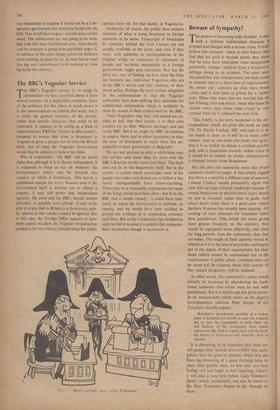The BBC's Yugoslav Service
MHE BBC's Yugoslav service is—to judge by I information we have received about it from several sources—in a deplorable condition. Some of the evidence for this (there is much more) is in the memorandum we publish this week; but it is really the general tendency of the service, rather than specific instances, that needs to be examined. It appears to be acting as a kind of supernumerary PRO for. Titoism in this country : designed to ensure that what is broadcast to Yugoslavia gives a picture not of what the British think, but of what the Yugoslav Government would like its subjects to believe we think.
Who is responsible? The BBC will no doubt claim that although it is in theory independent, it is supposed to keep an eye on whatever the Government's policy may be towards any country to which it broadcasts. This leaves a substantial margin for error, because even if the Government itself is anxious not to offend a country, it may still prefer that independent agencies, the press and the BBC, should remain itetached,,or possibly even critical—if only to be able to argue that as Britain is a democracy, pub- lic opinion in this country, cannot be ignored. But in this case, the Foreign Office appears to have been content to allow the Yugoslav broadcasting service to be run without consideration for public
opinion here—or, for that matter, in Yugoslavia.
Ordinarily, of course, the public here remains unaware of what is being broadcast to foreign countries in its name. Transcripts of broadcasts to countries behind the Iron Curtain are not usually available to the press; and even if they were, such subtleties as mistranslations of the original script, or omissions of references to people and incidents unpalatable to a foreign government, might pass unnoticed. Nor has the press any way of finding out how close the links are between, say, individual Yugoslays who are in the BBC's service and their embassy, or their secret police. Perhaps the most serious allegation in the memorandum is that the Yugoslav authorities have been milking their nationals for confidential information which is available to them by reason of their employment by the BBC.
These Yugoslays may feel, and indeed are en- titled to feel, that their loyalty is to their own country (or to their Marxist ideology) and not to the BBC. But if so, ought the BBC to continue to employ them, and to allow translators to alter the texts of broadcasts to make them less un- palatable to their government in Belgrade?
We are not anxious to start a witch-hunt over this service—any more than we were over the BBC's Russian service some time back. The fault does not lie in the department itself, but in the system—a system which encourages some of the people who make such broadcasts to follow a line barely distinguishable from fellow-travelling. There may be a reasonable explanation for some of the things which have been done—but if so, the BBC had a simple remedy : it could have insti- tuted, or asked the Government to institute, an inquiry, and we would have been satisfied to present our evidence to it, suspending comment until later. But as the Corporation has declined to reply we feel it necessary to publish this memoran- dum, incomplete though it necessarily is.
. . • there's nobody here called Parkinson.'










































 Previous page
Previous page